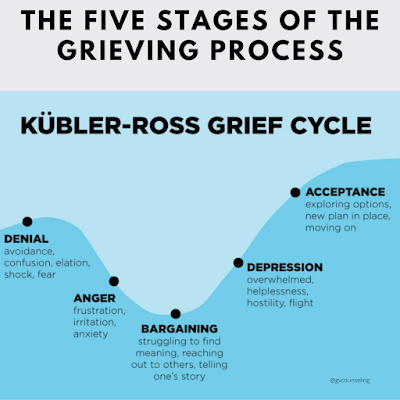I was inspired by a podcast called The 500 hosted by Los Angeles-based comedian Josh Adam Meyers. His goal, and mine, is to explore Rolling Stone Magazine's 2012 edition of The 500 Greatest Albums of All Time.
Album: # 330
Album Title: Tonight's The Night
Artist: Neil Young
Genre: Blues-Rock, Country-Rock, Pre-Grunge
Recorded: Multiple Venues (Live from the floor - No Overdubs)
Released: June, 1975
My age at release: 9
How familiar was I with it before this week: One Song
Is it on the 2020 list? Yes - #302 (Up 28 spots)
Song I am putting on my Spotify Playlist: None - Neil recently pulled his music from Spotify to protest the platform's decision to continue broadcasting conspiracy theories and Covid misinformation, particularly on The Joe Rogan Experience podcast. (Updated: December, 2024 - Neil is back on Spotify - Tonight's The Night added
How do you process grief?
I have been fortunate. I have not experienced much grief, yet we all know we are subject to deep sadness as we travel through life. And the older we get, the more evident that fact becomes. Personally, in my mid-fifties, I try not to think about such morbid matters and focus on the moment -- the present.
As a kid, I'd imagine making it to 100 years of age. I was optimistic that technology would advance to the point where most of the population born post World War II would easily reach that milestone. I suppose I still could. However, I hadn't factored in potential grief. A long life means having to say goodbye to loved ones and then living without them.Tonight's The Night, the sixth studio album by Canadian musician Neil Young, was an album born of grief. Two close friends of Young, guitarist Danny Whitten and road crew member Bruce Berry, died of heroin overdoses around the time Young was doing preparations for the recording of this record. Whitten’s loss was particularly painful because Young had dismissed him from the studio on the night of his overdose. As the story goes, Whitten was so absorbed by his addiction that he was unable to play his guitar. Young "fired" him from the gig, telling him to go home and get better. Instead, he left and purchased the heroin that would kill him that night.
The recording was completed in the summer of 1973, mostly on the evening of August 26, but its release was delayed for two years. However, in between, Young released a live record, Time Fades Away, and another studio album, On The Beach, which was recorded in 1974. The reason for the delay is unclear. Some speculate the record company chose to shelve it in favour of the live recordings. Others believe it was Young's choice to keep it, temporarily, for himself as a way of dealing with the raw emotion of Whitten’s death.
A cryptic note from Young is included in the liner notes of the record. It reads, "I'm sorry. You don't know these people. This means nothing to you." This apology was to the listener who would not know Whitten and Berry -- the "people" that inspired many of the songs on the record.
The book, Neil and Me, written by his father, Scott, suggests that there are even darker versions of these recording sessions stored in Neil's private archives. All, I would suspect, was part of Young's grieving process.
Upon release, it met with little commercial success, but was lauded by music critics. Rolling Stone Magazine writer Dave Marsh summarized the album as follows:
"The record chronicles the post-hippie, post-Vietnam demise of counterculture idealism, and a generation's long, slow trickle down the drain through drugs, violence, and twisted sexuality. This is Young's only conceptually cohesive record, and it's a great one."
So, how does one process grief? I'm not sure how effectively I do it. I suppose I go through the usual stages outlined by the Kübler-Ross Model - Denial, Anger, Bargaining, Depression and, ultimately, Acceptance.
I suspect I will write regularly while working through the first four stages: A way of focusing to process the pain. I suspect this might be something Young and I have in common -- aside from being fellow Canadians -- healing through the power of creativity.





No comments:
Post a Comment